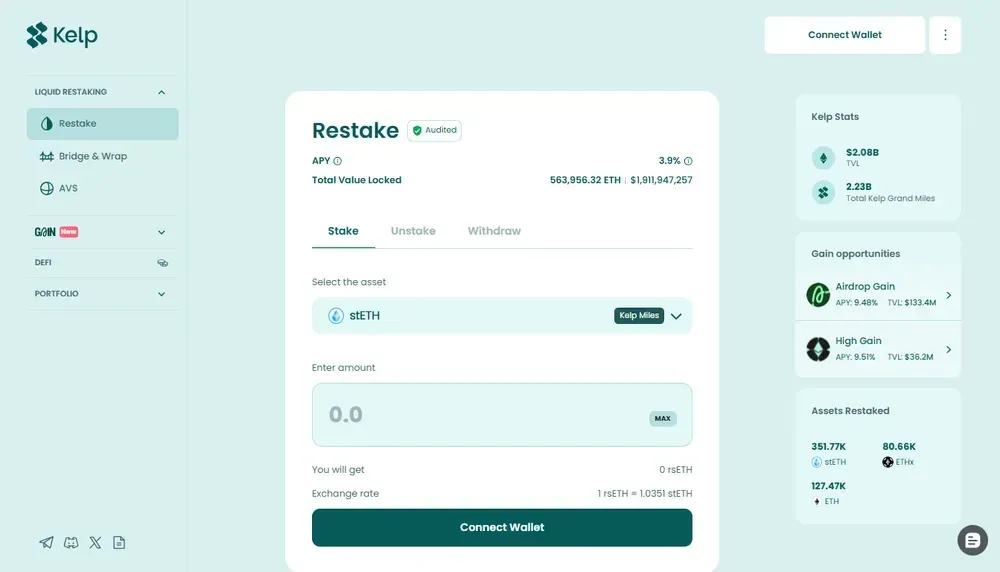Lido Explained: stETH, Staking & Tokenomics

Summary: Lido enables Ethereum liquid staking, allowing users to stake any number of Ether (ETH) and receive stETH liquid staking derivative tokens in return.
stETH accrues staking rewards at an annual rate of 3.30% APY while retaining liquidity for use in lending, yield farming, and other applications across more than 12 blockchain networks.
As the largest DeFi protocol, Lido manages over $32.5 billion in total value locked and commands more than 25% of the market. Its governance token, LDO, has a market capitalization of $1.88 billion.
Lido is the leading liquid staking protocol for Ethereum, securing over $32.5 billion in total value locked (TVL) and enabling users to stake ETH while maintaining liquidity.
Total Value Locked (TVL)
$32.5 Billion
Validators
297,000 Active Validators
Audits
Consensys, Statemind & SigmaPrime
What is Lido?
Lido Finance is a liquid staking platform that eliminates the 32 ETH minimum required for staking. Users can allocate any amount of ETH, receive stETH (staked Ether) as a tokenized representation of their deposit, and earn yield while maintaining liquidity for lending, farming, or collateral use.
The platform charges a 10% fee on staking rewards, shared between node operators and the Lido DAO, which funds development and governance via the LDO token. stETH accrues rewards over time, reflecting both the user’s stake and earnings, while allowing participation in DeFi.
In 2023, Lido V2 introduced a staking router with improved Distributed Validator Technology to optimize rewards. Later in 2024, the Community Staking Module (CSM) allowed solo stakers to run Ethereum validators with as little as 1.3 ETH, expanding accessibility and decentralization.
By 2025, Lido became the largest decentralized protocol, with over $32.5 billion in total value locked (TVL). Despite sunsetting support for the Polygon and Solana blockchains the previous year, it continues to dominate DeFi with over 25% market share.

How Does Lido Work?
Lido makes ETH staking accessible and liquid through a decentralized system, where users receive stETH tokens on a 1:1 basis representing their staked ETH, with no lock-ups.
Here’s a more detailed breakdown of how it works:
- Pooling User Deposits: Lido combines ETH from multiple users, allowing participants with less than 32 ETH to stake without needing to run their own validator node.
- Validator Delegation: Lido delegates the pooled ETH to a decentralized network of professional validators, spreading risk and improving network security.
- Smart Contract Management: Secure and audited smart contracts automatically manage the entire staking process, from deposits to rewards and withdrawals.
- Issuance of stETH Tokens: Users receive stETH tokens representing their staked ETH. These tokens earn rewards and can be used for additional DeFi rewards.
- Fee Structure: Lido charges a 10% fee on staking rewards, which is shared between node operators and the Lido DAO Treasury to support the platform’s development.

How to Stake on Lido Finance
Staking ETH on Lido Finance is a straightforward process that doesn’t require technical expertise or a large amount of ETH. Here’s how to get started in just five steps:
- Visit the Lido Website: Start by going to the official Lido Staking Portal at stake.lido.fi. This is where the entire staking process will take place.
- Connect Your Wallet: Click on “Connect Wallet” and choose a Web3 wallet like MetaMask. If you don’t have a wallet set up yet, you’ll need to create one first and fill it up with some ETH.
- Choose the Amount to Stake: After your wallet is connected, you’ll be able to select the amount of ether you want to stake.
- Approve the Transaction: Review your staking details carefully, including the gas for network fees. Once you're ready, click "Submit" and confirm the transaction in your wallet.
- Receive stETH Tokens: After confirming the transaction, you’ll receive stETH tokens in your wallet. These tokens represent your staked ETH and the rewards it earns.
If you can't see your stETH in MetaMask, you need to manually add it as a custom token using the contract address: 0xae7ab96520DE3A18E5e111B5EaAb095312D7fE84, symbol "stETH", and 18 decimals.

What can I do with stETH?
Staked Ethereum (stETH) is the core product of Lido, representing over 95% of the protocol’s total value locked. The token offers an annual percentage yield (APY) of approximately 3.30% through staking rewards, equivalent to $106.08 per year for staking 1 ETH at its current price.
While the base yield may seem modest, compounding can significantly increase returns over time. Additionally, Lido's liquid staking derivatives can be utilized across various DeFi protocols, unlocking opportunities for higher yields. Examples of these integrations are outlined below.
1. Use stETH in DeFi Lending Protocols
stETH can be used as collateral or supplied to lending platforms like Aave, Compound, or MakerDAO. You can borrow other assets against your stETH while still continuing to earn rewards from staking, enabling leveraged strategies or liquidity access for other DeFi activities.

2. Provide Liquidity in AMM Pools
stETH pairs with ETH and other tokens in automated market maker (AMM) liquidity pools like Curve, Uniswap, and Balancer for trading fees and liquidity mining rewards. Curve's stETH/ETH pool is a popular option, offering reduced impermanent loss due to the close peg between ETH and stETH.

3. Maximize Returns with Yield Aggregators
Yield optimization platforms like Yearn Finance, Harvest Finance, and Sommelier integrate stETH into automated strategies. These services help you earn additional rewards by compounding gains from liquidity pools or staking programs (and sometimes airdrops).

4. Access stETH on Layer 2 Networks and Sidechains
Lido's Multichain Hub simplifies the use of stETH across Layer 2 networks like Arbitrum, Optimism, and Polygon, as well as sidechains like Base and BNB Chain. These networks provide faster, low-cost transactions for using wstETH (the non-rebasing version of stETH).
- Arbitrum: Use wstETH in Aave, Compound, and Uniswap.
- Polygon: Access wstETH liquidity on Balancer, Aave, and Curve.
- Base: Explore wstETH utility with Aerodrome and Radiant.

5. Restake stETH for Additional Rewards
Protocols like Renzo, KelpDAO, and Eigenpie allow restaking of stETH for liquid restaking derivatives or added yield. These integrations enable you to amplify returns, while also farming airdop points for EigenLayer and other native tokens.

6. Borrow and Lend Cross-Chain
Cross-chain lending protocols like Radiant Capital and Zerolend enable straightforward borrowing and lending of stETH across multiple blockchains. These services help you earn yield or access liquidity across ecosystems without bridging assets manually.

Lido (LDO) Tokenomics
The LDO token is an ERC-20 governance token for decision-making within the Lido DAO. With a total supply of 1,000,000,000 tokens, LDO enables stakeholders to vote on governance parameters. The token was initially released in December 2020 with the following allocation:
- DAO Treasury: 36.32% of the total supply is allocated to the DAO treasury to fund ecosystem development and community initiatives, with no immediate vesting or unlock restrictions.
- Investors: 22.18% to investors who supported Lido’s early development, with these tokens subject to a one-year lock-up from the token generation event (TGE), followed by a linear vesting period.
- Validators and Signature Holders: 6.5% is reserved for validators and participants in the threshold signature scheme, with a similar vesting structure as investors.
- Initial Developers: 20% is allocated to the initial development team, with a one-year lock-up from the TGE, followed by a linear vesting period over the next year.
- Founders and Future Employees: 15% is allocated to the founders and future employees, with tokens locked for one year from the TGE and vested linearly over the subsequent year.
As of now, approximately 896 million (89.6%) of the total supply of LDO is in circulation, with the token's market capitalization at $1.88 billion, down from its peak of $3.37 billion in January 2024.

Is Lido Safe?
Lido's liquid staking is regarded as one of the safest yield-generating methods in decentralized finance, second only to traditional staking and stablecoin liquidity pools. This level of security is achieved through audited smart contracts and an extensive bug bounty program.
The protocol’s reputation is further supported by a decentralized network of over 297,000 active validators, securing 28.27% of Ethereum’s network. With a 98.5% validator uptime rate, it ensures consistent performance and minimal disruptions for users.
Despite these safeguards, certain risks persist, including vulnerabilities in smart contracts, technical challenges tied to Ethereum’s ongoing development, and fluctuations in stETH value. Additionally, users may face slashing penalties, stETH price volatility, and liquidity constraints.

Founders
Lido Finance was founded in 2020 by Konstantin Lomashuk, Vasiliy Shapovalov, and Jordan Fish (Cobie on X) to address the challenges of Ethereum’s transition to Proof-of-Stake (PoS). Their goal was to make staking accessible, liquid, and inclusive by removing the 32 ETH requirement.
Konstantin Lomashuk, a blockchain expert, previously co-founded P2P Validator, a staking service provider, while Vasiliy Shapovalov played a key role in Lido’s technical development. Jordan Fish is a respected figure in Crypto Twitter, known for his insightful commentary and analysis.
In January 2025, discussions about a "Second Ethereum Foundation" gained attention, with Lido co-founder Konstantin Lomashuk mentioned as a potential leader. Lomashuk denied these claims, clarifying that no such foundation exists.
Final Thoughts
Lido is integral to Ethereum's security, enabling increased staking participation through its liquid staking platform, which manages billions in value. By allowing investors of all sizes to stake ETH while maintaining liquidity, it addresses barriers to entry and promotes greater adoption.
However, its market dominance presents centralization risks that could challenge Ethereum’s decentralization goals. To mitigate these risks, the Lido DAO must focus on maintaining a transparent and autonomous protocol to sustain trust in its brand and products.

Written by
Emily Shin
Research Analyst
Emily is passionate about Web 3 and has dedicated her writing to exploring decentralized finance, NFTs, GameFi, and the broader crypto culture. She excels at breaking down the complexities of these cutting-edge technologies, providing readers with clear and insightful explanations of their transformative power.

.webp)


.webp)




